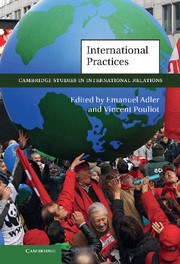Book contents
- Frontmatter
- Contents
- Figure
- Note on the contributors
- Acronyms and abbreviations
- Part I Practices in International Relations and social theory
- Part II Practices and their background
- 3 A practice theory of emotion for International Relations
- 4 Background knowledge in the foreground
- 5 Interactional international law and the practice of legality
- Part III The evolution of practices
- Part IV Practices in practice
- Part V Conclusion
- Index
- References
5 - Interactional international law and the practice of legality
from Part II - Practices and their background
Published online by Cambridge University Press: 05 June 2012
- Frontmatter
- Contents
- Figure
- Note on the contributors
- Acronyms and abbreviations
- Part I Practices in International Relations and social theory
- Part II Practices and their background
- 3 A practice theory of emotion for International Relations
- 4 Background knowledge in the foreground
- 5 Interactional international law and the practice of legality
- Part III The evolution of practices
- Part IV Practices in practice
- Part V Conclusion
- Index
- References
Summary
Introduction
International law has long struggled to find a place as “real” law. For domestic lawyers, the problem is that international law has few binding enforcement mechanisms, an underdeveloped court system and no international police force. Many International Relations (IR) scholars treat international law as largely irrelevant because they focus primarily on the rational pursuit of material interests to predict behavior. Even international lawyers have found it hard to explain convincingly why states and other actors “obey” legal norms. Although international lawyers have recently turned their attention to compliance, in our view this work has yet to build a compelling argument as to what distinguishes the influence of law from that of other social norms. The question is still properly asked: “Are legal norms distinctive?”
Our answer is an emphatic “yes.” Law’s distinctiveness rests in the concept and effects of legal obligation. We will show that legal obligation is best explained as resulting from the work of communities of legal practice that uphold specific criteria of legality. It is the fulfillment of these criteria, supported by a continuing practice of legality, that amount to what Adler and Pouliot call “competent performances” of the practice of international law.
- Type
- Chapter
- Information
- International Practices , pp. 108 - 136Publisher: Cambridge University PressPrint publication year: 2011
References
- 15
- Cited by



